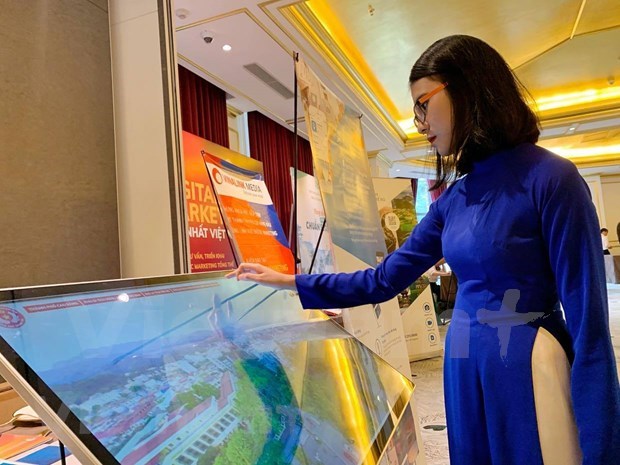Digital transformation to revitalise post-COVID-19 tourism
Hanoi (VNA) - The COVID-19 pandemic has crippled the global economy and travel companies are among the worst hit. Vietnamese travel companies are adjusting their business strategies and promoting digital transformation to recover and grow.
 Today, most young people use technology to get tourism information (Photo: VietnamPlus)
Today, most young people use technology to get tourism information (Photo: VietnamPlus)The danger and unpredictability of COVID-19 has changed tourists' behavior. They become more demanding. Therefore, travel businesses which implement digital transformation can meet customer needs.
It is COVID-19 that contributes to promoting digital transformation in the tourism industry in order to help it overcome the consequences of the pandemic, restore and develop. This was also the content of the forum "Digital transformation for development of Vietnamese tourism" just held on September 30 in Hanoi.
Tourism looks toward digital economy
According to the World Tourism Organisation, COVID-19 has caused global tourism a loss of 1 trillion USD and a decline of 1 billion travellers.
Though the pandemic has been contained in Vietnam and many stimulus programmes have been implemented, international visitors to Vietnam in 2020 is likely to decrease by at least 70 percent compared to 2019, while the number of domestic visitors will be reduced by 50 percent, and the revenue from tourism activities will fall over 61 percent, said the Vietnam Tourism Association (VITA).
However, in the context of unpredictable developments of the pandemic, online economic activities have saw strong opportunities to develop. In the first six months of 2020, many online businesses have grown 50-200 percent, showing that the application of new technology has proven superiority in overcoming the consequences of COVID-19 in particular and promoting economic development in general.
Nguyen Thanh Hung, Chairman of the Vietnam E-Commerce Association, said IT application will help businesses quickly recover from the pandemic and grow. Travel companies have already embraced digital transformation but now the process needs to be accelerated.
"In this crisis, we realise the importance of IT and the internet in our business and economic activities. Tourism has been hurt by the epidemic. It is also the sector that has most widely applied information technology,” he said.
 A tourist seeks information on destinations via digital technology (Photo: VietnamPlus)
A tourist seeks information on destinations via digital technology (Photo: VietnamPlus)
According to VITA Vice Chairman Vu The Binh, this extremely difficult situation requires tourism businesses to adjust their strategies to quickly recover and gain growth again when the pandemic is under control, he said, adding that comprehensive digital transformation is part of these strategies.
Through digital transformation, travel agencies can reach more travellers, provide better care to customers, reduce costs and increase business efficiency, he said.
Digital transformation is an inevitable trend which helps businesses improve their competitiveness, he added.
Binh said technologies used in digital transformation in the tourism sector are mobile technology, cloud computing and Internet of Things (IoT), augmented reality/virtual reality (AR/VR), artificial intelligence (AI); block chain; and e-commerce.
Spreading digital transformation in tourism
Nguyen Van Hung, Deputy Minister of Culture, Sports, and Tourism, said: "Tourism has close links with other economic sectors like trade and transport. Due to COVID-19, travel companies need to work more urgently and resolutely. We need to focus on digital transformation, take advantage of the technological revolution, implement stimulus programmes, and pay more attention to the domestic market. Difficulties will be overcome soon."
 Deputy Minister of Culture, Sports and Tourism Nguyen Van Hung (Photo: VietnamPlus)
Deputy Minister of Culture, Sports and Tourism Nguyen Van Hung (Photo: VietnamPlus)
“We must make concerted efforts to both control the pandemic and step up digital transformation in tourism,” he said.
According to Hung, the major tasks are to focus on promoting the application of digital technology in tourism marketing, manage tourist destinations intelligently, ad build tourism information systems and applications.
The Vietnam National Administration of Tourism (VNAT) must call for the response of businesses to boost the application of information technology in the tourism sector, he noted.
The world is now in the 4th Industrial Revolution. New technologies like cloud computing, the Internet of Things, artificial intelligence, and virtual reality have changed the world economy and improved people’s lives. Through promoting digital transformation, travel companies can gain more customers, better serve customers, reduce costs, and improve their efficiency. COVID-19 has motivated businesses, particularly travel companies, to accelerate digital transformation in order to improve their competitiveness.
The World Economic Forum (WEF) estimates that digital transformation in the 2015-2025 period will generate 305 billion USD for the tourism industry and 700 billion USD for tourists and society via mitigating impacts on the environment, improving safety, and saving costs and time for tourists./.













